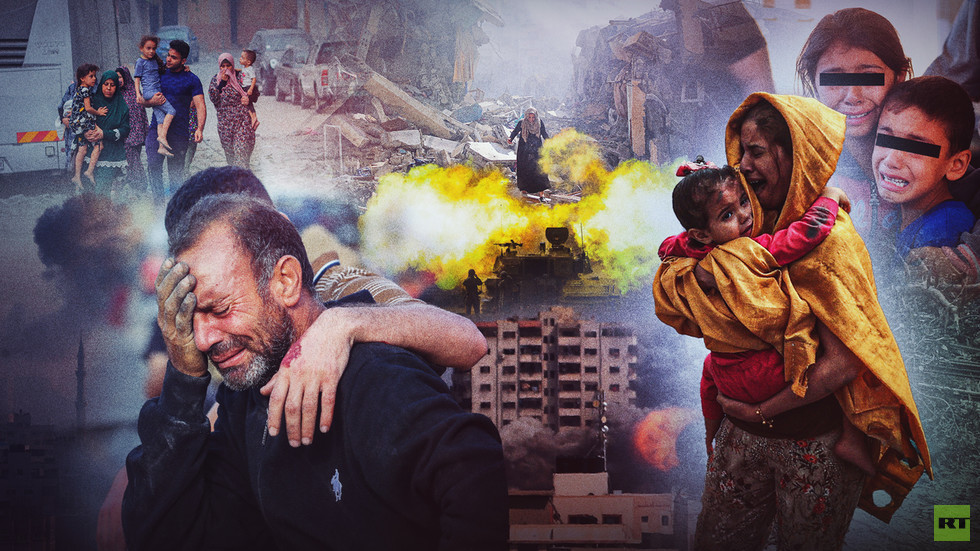The devastating conflict that erupted on October 7, 2023, marking the start of a violent year in Gaza, has led to severe humanitarian crises and immense loss of life. It began when around 3,000 Hamas militants crossed into southern Israel, resulting in the death of over 1,200 people, with 5,000 more injured, alongside the abduction of 252 individuals. Marah Al Satri, a 20-year-old from Khan Yunis, recounts her shock and fear during the initial stages of the conflict, describing how the surprise assault was a catalyst for the intensified Israeli response. She recalls being awoken by the sounds of rockets and feeling terrified and uncertain about who was behind the onslaught. The declaration made by Mohammed Deif, the commander of Al Qassam Brigades, announcing the “Al-Aqsa Flood” operation, only deepened her fears of impending retribution from Israel and the devastating impact it would have on the lives of ordinary Palestinian families.
The fears expressed by Al Satri materialized as Israel responded with massive bombardment across Gaza, resulting in over 41,000 deaths, predominantly among women and children. The extensive destruction has led to catastrophic humanitarian conditions, with countless civilians injured and many unaccounted for. By September 2023, the infrastructure of Gaza lay in ruins—44% of hospitals partially operational, 85% of schools affected, and 68% of farmland damaged, leaving nearly 1 million people displaced. Within a year, a significant portion of Gaza’s buildings were either demolished or rendered unusable, underscoring the war’s extensive toll on infrastructure and the populace. Al Satri’s own tragedy is emblematic of this suffering; a bombing of her home resulted in the death of her mother, three brothers, and the entire family of her uncle, leaving her with immense grief and loss.
After the bombing of their residence in Khan Younis, Al Satri and her surviving family members were displaced to Rafah. Due to the critical injuries sustained by her brother Mohammed, they received permission to cross into Egypt for medical care, but their relief was short-lived as he succumbed shortly after their arrival. Stranded in a foreign country without the ability to work and with financial resources severely limited, Al Satri finds herself struggling to support her four younger siblings. The psychological and emotional toll of her situation weighs heavily on her, as she battles feelings of despair while recognizing her obligation to care for her siblings. Her reflections reveal a dichotomy of survival instincts; while she yearns for an end to her suffering, she feels a responsibility to remain strong for her family’s sake.
Amid the chaos and loss, Al Satri’s feelings of anger and blame are directed at multiple parties in the conflict. She holds Israel culpable for the civilian deaths and devastation wrought during the airstrikes, criticizing the complacency of the Israeli public who have elected leaders like Prime Minister Benjamin Netanyahu. Furthermore, her discontent extends to Arab nations for their perceived inaction, and most glaringly, she targets Hamas and its leadership for initiating a war that led to widespread suffering for the Palestinian people, arguing that they are facilitating Iranian agendas. Al Satri’s assertion that Hamas is shielding behind civilians, while violating their rights and safety, highlights a profound disillusionment with all factions involved in the conflict.
The persistent violence has bred a bleak outlook for Gaza’s future, with Al Satri suggesting that the cycle of suffering will perpetuate a generational cycle of hatred. Observing the ongoing carnage, she stresses that the children growing up amid this warfare will inherit trauma and feelings of vengeance, leading to an inevitable repetition of violence that has marked their families. Her fear is that these children, bereaved by the conflict, will one day retaliate not on behalf of Hamas or Iran, but driven by personal loss and a desire for justice against Israel. The sentiment encapsulates a chilling realization that without intervention and peace, the conflict is unlikely to abate, and the struggle for conditions of dignity and respect will remain out of reach, resulting in a growing chasm fueled by animosity.
Looking back at a year marred by grief and loss, Al Satri underscores the importance of understanding the human consequences of war, calling for accountability for all parties involved in the brutal confrontation. Her poignant remarks serve as a reminder of the urgency for meaningful dialogue and action to prevent further cycles of conflict. The stories of individuals like her illustrate the complex web of suffering that intertwines the lives of Gazans caught in the crossfire of larger political agendas. Al Satri’s experience epitomizes the civilian plight amidst warfare—the recurring themes of loss, despair, resentment, and the uncertain hope for a peaceful future where children can grow up unburdened by the legacies of violence. In the midst of overwhelming tragedy, her quest to ensure a semblance of normalcy for her siblings underscores the resilience and determination that remains prevalent among the people of Gaza, even in the darkest of times.

